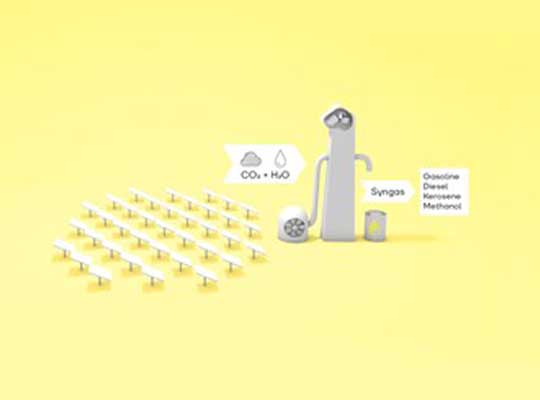- Synhelion utilizes Ansys solutions to enable sustainable transportation and reduce CO2 emissions by replacing fossil fuels with solar fuels
- Synhelion uses Ansys’ multiphysics simulation through the Ansys Startup Program to overcome design challenges, predict future outcomes, and reduce prototyping time
- Synhelion will build the world’s first plant capable of producing solar fuels at an industrial scale in 2022
Ansys solutions are helping Synhelion steer toward cleaner transportation and net-zero emissions by helping to enable the development of solar fuels to replace fossil fuels. Synhelion became a member of the Ansys Startup Program in the beginning of 2020 when cooperation with the Swiss Elite Channel Partner CADFEM started. As global pioneer in the field of sustainable solar fuels, Synhelion uses Ansys’ multiphysics simulation solutions and high-temperature solar heat to convert carbon dioxide (CO2) and water into synthetic fuels — such as solar gasoline, diesel, or jet fuel — that are compatible with conventional internal combustion engines and aircraft turbines.
To perform this conversion, mirrors reflect the sunlight and concentrate it directly onto a solar receiver where a heat-transfer fluid is heated to temperatures up to 1,500 degrees Celsius, or 2,732 degrees Fahrenheit. This solar heat is then used to drive the thermochemical reactor that produces sustainable fuel. Synhelion leverages Ansys’ computational fluid dynamics (CFD) and finite element analysis (FEA) software entrusting Ansys Fluent and Ansys Mechanical to understand the complex flow and replicate thermo-fluid dynamics to design and validate capable equipment, despite scorching temperatures. With Ansys’ best-in-class simulation tools, Synhelion can overcome design challenges, predict future outcomes, and reduce prototyping time. The resulting solar fuel solves various challenges, including being cleaner, more economic, easier to transport, and able to be stored indefinitely.
“Ansys’ CFD and FEA simulation allows us to develop, test, and validate extremely complex technology to create sustainable solar fuels,” said Lukas Geissbühler, Head Thermal Systems at Synhelion. “Particularly, in developing our solar receiver, we needed sophisticated and predictively accurate software and Ansys delivered. Thanks to Ansys’ software, we could reduce prototyping time and build our first industrial receiver more quickly.”
By using concentrated solar energy directly in a thermochemical process, Synhelion can utilize 100% of the light spectrum, rather than employing photovoltaic (PV) panels, where only 20% of the light spectrum can be utilized. Further, Synhelion’s thermal energy storage technology enables low-cost solar heat round-the-clock — giving a significant advantage over competitors, who require expensive electricity storage for continuous operation.
“Ansys is passionate about creating a sustainable future from road infrastructure to aviation and everything in between,” said Shane Emswiler, senior vice president of products at Ansys. “By helping to enable a solution for sustainable fuels, we are driving sustainable innovation forward on the ground and in the air, addressing climate change challenges, and moving toward a cleaner future.”
Synhelion recently raised 16 million Swiss francs (about $17.5 million) during its Series B funding round and will use the funding to build the world’s first plant capable of producing solar fuels at an industrial scale. Synhelion is also using solar heat to produce cleaner cement, working in partnership with CEMEX, a global concrete and cement manufacturing company.











